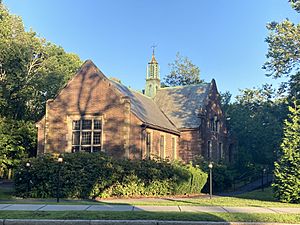Waban, Massachusetts facts for kids
Waban is a village located in the city of Newton. It's one of thirteen villages in Newton, which is in Middlesex County, Massachusetts, USA.
Contents
Waban's Location and History
Waban is bordered by the Charles River and Route 9 to the south. Route 16 is to its west. Long ago, Waban was a place with many trees. In the 1800s, it became a farming village. People knew it for its fruit orchards, farms, and plant nurseries.
The Cochituate Aqueduct was built here between 1846 and 1848. This aqueduct was a way to carry water. Part of it is now a walking trail. Waban grew much faster after 1886. This was when a train station opened. The Boston & Albany Railroad built this station. It was part of the Highland Branch line. Today, the MBTA Green D Line serves Waban.
How Waban Got Its Name
The village of Waban was named after a Native American leader. His name was Waban. He was one of the first members of the Massachusett tribe to become Christian in 1646. He might have lived closer to Nonantum, a hill about two miles away. However, this area by the Charles River was good for hunting and fishing.
Dr. Lawrence Strong explained why the village got this name in 1886. His father, William Chamberlain Strong, helped the Boston and Albany Railroad. He helped them get the land for the train tracks. When a station was built, a new village was forming. It needed a name.
Dr. Strong's father had lived near Nonantum Hill before. This was where Chief Waban lived. It was also where Eliot, a famous preacher, taught. A memorial marks that spot today. So, the name "Waban" seemed like a good idea for the new village. The name Waban, or Wabanoki, means "east" in the Native American language. The way it's spelled might not match how it sounds. Dr. Strong believed the pronunciation was correct. He thought the spelling should be Wauban or Waughban.
Important Buildings and Green Spaces
Many important buildings are in Waban. These include:
- The Staples-Craft-Wiswall Farmhouse: This is now the home of the Suzuki School of Newton.
- Waban Hall (built in 1890)
- The Parish of the Good Shepherd (built in 1896)
- The Strong Building (built in 1896)
- The Union Church in Waban (built in 1912)
- The Waban Library Center (built in 1930)
Near the shopping area on Beacon Street, there was once a farm. This farm helped people who were poor.
The first librarian in Waban was Dr. Fanny McGee. She was also one of the first women doctors. She earned her medical degree in 1897. The library got its own building in 1930. Waban's library was one of only two in Newton to stay open. All sixteen original branch libraries closed by 2008. In 2009, the Waban branch library reopened. It is now the Waban Library Center. It is run by the Waban Improvement Society.
Waban Common is a public green space. It is next to Beacon Street. The community helps take care of it. It was created in 2017. This happened when two traffic islands were joined together. This was done while the new Angier School was being built.
Waban's High Ranking
In 2013, the Washington Post newspaper studied zip codes in America. They looked at how wealthy and educated people were. Waban (zip code 02468) ranked third in the whole country. This study looked at how many college graduates lived there. It also looked at the average household income.
Waban was only behind Kenilworth, Illinois, and Short Hills, New Jersey. This made it the wealthiest zip code in Massachusetts. The Census Bureau also reported that Waban (02468) had the 14th highest average household income in the United States in 2017. It was the highest in Massachusetts.
Famous People From Waban
Many well-known people have lived in Waban:
- Harry C. Bentley (1877–1967): He founded Bentley University.
- Ralph Waldo Emerson (1803–1882): A famous writer, he lived here from 1833 to 1834.
- Atul Gawande: A surgeon, writer, and public health expert.
- Roger Kellaway (born 1939): A Grammy-winning pianist and composer.
- Jack Lemmon: A famous actor, he was born in an elevator at Newton-Wellesley Hospital in Waban.
- Robert Morse: An actor who won Tony awards.
- Ric Ocasek: A music producer and singer for the band The Cars. He lived in Waban in the 1980s.
- Fritz Richmond: A folk musician.
- Henry Lawrence Southwick (1863–1932): An author, actor, and president of Emerson College.
- William Chamberlain Strong (1823–1913): A plant expert, community leader, and developer.
- Cass Sunstein: A legal scholar and author.
- Jason Varitek: A catcher for the Boston Red Sox. He won the World Series in 2004 and 2007.
- Ben Wanger (born 1997): An American-Israeli baseball pitcher for Team Israel.
 | Emma Amos |
 | Edward Mitchell Bannister |
 | Larry D. Alexander |
 | Ernie Barnes |


